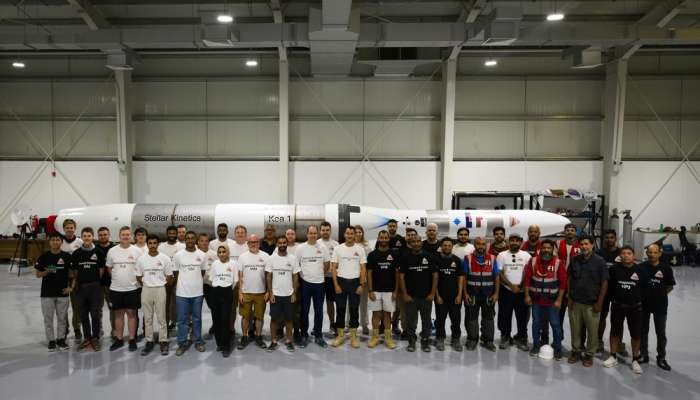
Duqm: The second mission of a series of experimental space rocket launches, Duqm-2, has successfully concluded on Sunday without ignition of the vehicle.
Stellar Kinetics’ Kea-1, a two-stage guided experimental suborbital vehicle, was set to launch from Etlaq Spaceport before it was halted during the final preparations due to a technical issue with onboard actuators.
Etlaq, Stellar Kinetics, and institutional partners gathered immense data leading up to the launch attempt before initiating protocols to safely unload the propellants from Kea-1 and secure the premises.
Etlaq has successfully prepared and executed spaceport activities, accomplishing a number of goals and gaining critical insights across technical, operational, and logistical aspects.
The Duqm-2 mission supported the upskilling of Omanis in launch operations such as handling cryogenics, establishing power systems, constructing launch pad infrastructure, and providing tenant services. The launch attempt marked a major operational success for Etlaq Spaceport.
HH Sayyid Azzan Qais Al Said, CEO of Etlaq Spaceport, said: “We achieved many objectives of the Duqm-2 mission, including planning the mission, navigating regulatory processes, designing ground infrastructure, and building an integration hangar.
Today’s stand down of the launch reflects the diligence and precision required in aerospace operations. We commend the teams, both local and international, for their disciplined decision-making in prioritizing safety and system integrity. Etlaq Spaceport continues to rapidly acquire knowledge to prove itself as a capable, reliable host, and this effort further strengthens our role in building sustainable, skill-based partnerships in the global launch ecosystem.”
The experimental suborbital vehicle was designed by Stellar Kinetics to prove orbital class systems such as stage separation and guidance and navigation systems, while operating in the Middle Eastern summer on unprecedented timelines. Over the course of the 2 week campaign, the vehicle underwent successful payload integration, electronics testing, and fuel tank filling.
A spokesperson for Stellar Kinetics said: “It has been an exciting few months working closely with the Etlaq and NASCOM teams preparing for this mission. We proved out the majority of our objectives, demonstrating how fast we can move through this complex program with our regional partners. The National Space Program and Civil Aviation Authority provided support throughout, allowing agility and responsiveness in the regulatory environment that is immensely valuable for a fast paced program like the Duqm-2 mission.
The spokesperson added that the Stellar Kinetics team encountered an issue with a COTS valve actuator used for various systems on the Kea vehicle. We are postponing the launch until a replacement solution is developed. Whilst the ignition moment was missed, this mission delivers on the calendar announced in February. Over the next 4 months we anticipate a series of subsequent launches to continue on the R&D pathway. As the program builds momentum, we expect to see a steady stream of both experimental and commercial Stellar Kinetics vehicles launching from the Etlaq Spaceport.
The Kea-1 vehicle carried two tethered payloads from international partners, spanning the UK and Taiwan, for scientific research and microgravity testing. The mission offered hands-on experience and critical data that will support the next generation of aerospace talent both locally and globally.
Ieuan Carney, a PhD student from the University of Surrey leading the Jovian-O team on behalf of JUPITER, said: “Although the payload didn’t get to deploy, it’s something we were prepared for because we know space projects often have set-back in the early stages. We’re still so proud of what we’ve done, developing a payload and fitting it onto a rocket.”
SIGHT Space founder, Kevin Chen, said: “The experience of working alongside Stellar Kinetics and Etlaq Spaceport has been invaluable for our team and the National Central University in Taiwan. We are proud to have reached this milestone and this collaboration reminds us that progress in space always comes through testing, iteration, and international cooperation.”
Duqm-2 stands as a proud milestone for Etlaq and the Sultanate of Oman, reflecting its growing leadership in fostering international collaboration and enabling access to space. Etlaq Spaceport remains committed to supporting the global launch community by offering secure, responsive infrastructure for testing, suborbital research, and commercial demonstration. Each mission advances the capabilities and learnings that shape the future of space access.